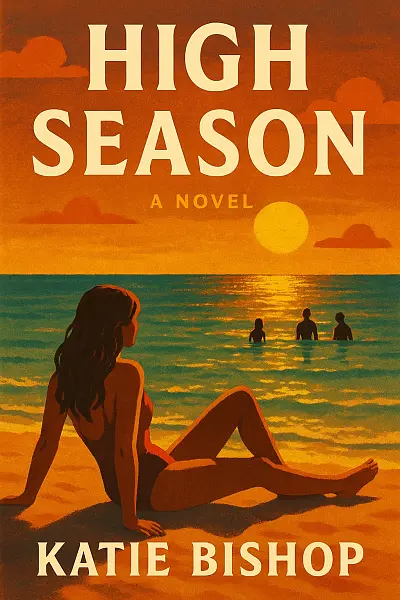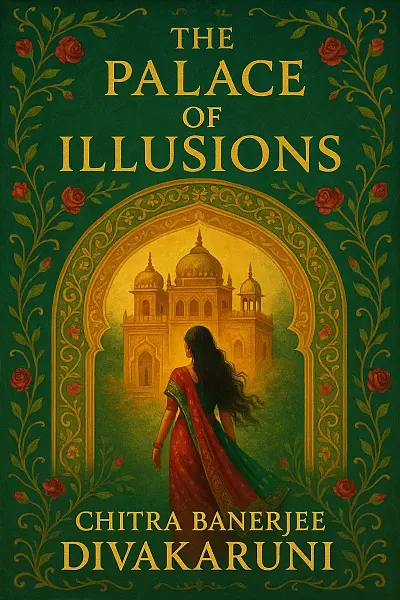
High Season
by: Katie Bishop
Nina Drayton grows up marked by tragedy—her glamorous sister Tamara drowned at seventeen, and young Nina was the only witness.
Years later, Nina’s fractured memories and lifelong doubts haunt her quiet existence, until a buzzy true crime documentary about Tamara’s death drags the past into the present.
Desperate for closure, Nina dives back into the swirling secrets of that fateful summer in France, confronting old family wounds and her own unreliable vantage point. As doubts ignite, she grapples with messy truths, questioning everything she thinks she knows.
Will Nina risk everything to uncover what really happened—and if she does, can she handle it?
"Sometimes the tides of memory return not to remind us of who we were, but to show us who we still might become."
Let's Break This Down
The Author's Voice
Atmosphere
- Salty, sun-steeped air, the scent of grilled seafood, and the constant lull of distant surf—Katie Bishop crafts an ambiance that’s both intoxicatingly escapist and tinged with nostalgia. Expect settings that pulse with life and longing, each location dripping with sensory detail, making you feel sand between your toes and sun on your neck. The mood is equal parts breezy summer and subtle melancholy, inviting you to slip into a world that’s vibrant yet edged with realism.
Prose Style
- Bishop’s writing is accessible but evocative—think clear, unpretentious sentences peppered with deft imagery and emotional undercurrents. You’ll find the dialogue is snappy and realistic, lending authenticity to every exchange. There’s a natural rhythm here, never overly ornate, but Bishop knows how to spin a memorable phrase when the moment calls for it. The prose flows smoothly, with just enough lyricism to paint vivid pictures without slowing you down.
Pacing
- The pace is relaxed yet propulsive—you won’t feel rushed, but you definitely won’t be bored. Bishop excels at unspooling personal revelations and plot turns at just the right moments, balancing introspective passages with snappier scenes. If you love a story that gives relationships room to breathe while still delivering punchy moments of drama, you’ll appreciate the gentle ebb and flow; it’s a slow burn with bursts of excitement.
Character Focus
- Expect layered, intimately drawn characters—especially the protagonist, whose emotional journey is explored with sensitivity and nuance. Backstories are revealed gradually, with Bishop favoring deep dives over surface sketches. Characters feel imperfect and relatable, facing dilemmas that resonate well beyond the page. Relationships—romantic, platonic, and complicated—are at the heart of everything, intertwined with the setting to create a sense of personal stakes.
Overall Vibe
- Transportive, bittersweet, and deeply human. If you love summer stories with substance, nuanced emotional arcs, and writing that’s as inviting as a beachside veranda at sunset, High Season is your kind of escape. Unexpectedly tender, occasionally sharp, it’s the sort of book that lingers with you after the tide has gone out.
Key Moments
- Summer friendships tested as secrets simmer beneath sun-soaked island nights
- Anna’s impulsive midnight swim—one reckless decision, countless consequences
- Flashbacks unravel a forbidden romance that lingers like salt on skin
- Jealousy and nostalgia intertwine, blurring loyalty and desire
- Bittersweet homecomings: old flames, new betrayals—nobody leaves unchanged
- Sharp, sensory prose makes every wave and cocktail taste like longing
- That stormy beach confrontation—raw, messy, impossible to forget
Plot Summary
High Season by Katie Bishop kicks off with Rachel, a thirty-something journalist, and her husband Ed heading to a Greek island for a much-needed escape from their routine lives. As the summer unfolds, Rachel is drawn into a close-knit, intoxicating community of enigmatic expats and young locals, reigniting memories of a life-changing romance she experienced on the same island years earlier. When a body washes ashore and secrets from the past begin to unravel, the idyllic vacation rapidly turns into a tangled confrontation with buried guilt and unresolved trauma. Rachel must confront her choices as a teenager, her shifting marriage, and the real cost of the glamourous freedom she once envied. The story resolves with Rachel gaining clarity about her past, finally accepting responsibility, and choosing to forge a new path forward, even if it means leaving certain illusions behind.
Character Analysis
Rachel stands out as a richly layered protagonist, torn between nostalgia and the reality of her present life. Her journey from escapism to self-confrontation is believable and fraught with missteps; the painful process of reckoning with her past relationship with Alistair, an older, charismatic man, forms the emotional core of the novel. Ed, her husband, is portrayed as loving but increasingly distant, symbolizing the stability she feels both safe and trapped by. The supporting cast—including the vibrant, magnetic Anna and the shadowy Alistair—serve as mirrors for Rachel’s desires and blind spots, pushing her toward painful self-awareness.
Major Themes
At its heart, High Season explores the seductive pull of nostalgia and the complexity of consent, especially in the blurred spaces between youth and adulthood. Questions about power dynamics in relationships—particularly those with significant age differences—are threaded throughout, challenging Rachel and the reader to reconsider the stories we tell ourselves about agency and victimhood. The novel unpacks the contrast between surface-level beauty and underlying corruption, especially within tight-knit ex-pat circles, as seen in the fatal consequences of the group’s secrets. Ultimately, it’s a story about reclaiming one’s narrative and making peace with uncomfortable truths.
Literary Techniques & Style
Bishop’s writing is direct yet evocative, using sensory detail to immerse readers in the sights, smells, and heat of the Greek summer. Flashbacks are expertly woven with the present-day narrative, creating suspense and gradually unveiling the layers of Rachel’s past and her complicated feelings. Symbolism abounds, with the recurring image of the sea reflecting both freedom and danger—mirroring Rachel’s psychological journey. Dialogue feels natural and unforced, while metaphors related to light and shadow enhance the novel’s central theme of revelation versus concealment.
Historical/Cultural Context
The story unfolds against the backdrop of a contemporary Greek island—a haven for wealthy tourists and British expats alike. This setting draws attention to issues of privilege, gentrification, and cultural displacement, as the local community contends with the seasonal influx of outsiders chasing paradise. Although the events are fictional, the novel taps into real discussions about consent, exploitation, and the shifting boundaries of post-#MeToo culture, particularly in holiday settings where rules seem elastic.
Critical Significance & Impact
High Season has made waves for its unflinching portrayal of uncomfortable truths behind “paradise” settings and its timely exploration of consent and power. Readers and critics praise the novel for its suspenseful structure and honest voice, though some find its conclusion unsettlingly ambiguous. Whether you see it as a cautionary tale or a nuanced coming-of-age story, Bishop’s debut sparks much-needed conversations about memory, agency, and the ways we mythologize our formative experiences.

Summer secrets unravel as old flames ignite on an island caught in time.
What Readers Are Saying
Right for You If
If you’re wondering if High Season by Katie Bishop is for you, here’s the scoop:
-
Love a good mix of vacation escapism and soul-searching? This one’s totally for anyone who likes their summer reads with a dash of nostalgia, a side of romance, and a touch of real-life messiness. If you swoon over books that remind you of gap years, backpacking adventures, or that one life-changing summer, you’ll feel right at home here.
-
Big on coming-of-age stories, even for grown-ups? You’ll click with this. Bishop does a great job unpacking what it means to look back at your younger self and question the choices you’ve made. Fans of contemporary women’s fiction or honestly, just character-driven stories in general, will find a lot to love.
-
If you’re a sucker for stories about nostalgia and second chances (but don’t mind a dash of bittersweet), add this to your list. There’s a breezy Mediterranean backdrop, but underneath, Bishop’s writing digs into more complicated emotions and relationships. So if you like your summer escapism realism-tinged and thoughtful—not just sun-tanned fluff—go for it.
-
On the other hand...
-
If you’re all about fast-paced thrillers, high-stakes plot twists, or wild cliffhangers, you might find this one a little mellow. The pacing is more “slow afternoons and introspective reflecting” than “edge of your seat.”
-
Readers who aren’t into messy relationships or morally ambiguous characters might get frustrated. Some of the decisions here might make you want to shake the characters!
-
If you want clear-cut romance with a neat, tidy love story, just know this one lingers more in the gray areas. It’s less rom-com, more “what if?” territory.
-
Bottom line: If you like reflective, beautifully written stories that make you think about your own choices—especially with a little sand between your toes—High Season will probably hit the spot. If you’re looking for pure escapism, steamy beach reads, or a tightly-plotted thriller, maybe grab something else for your TBR pile.
What You're Getting Into
**High Season by Katie Bishop drops you right into the golden, sun-soaked world of a remote Greek island, where fifty-something Rachel returns decades after a coming-of-age summer that forever changed her. Pulled between the ache of nostalgia and the sharp realities of her present, Rachel finds old connections reignited and buried secrets surfacing. With an intoxicating mix of wanderlust, memory, and tension, this is one of those compulsively readable books that makes you question what you wish you could forget—and what you long to relive.
Characters You'll Meet
-
Rachel: The restless protagonist, she's a journalist grappling with dissatisfaction in both her marriage and career. Her journey to Greece forces her to confront unresolved feelings from her past and the complexities of adulthood.
-
Sebastian: Rachel’s enigmatic summer love from her teenage years. His reappearance weaves him back into Rachel’s life, rekindling old memories and complicating her search for closure.
-
Tom: Rachel’s steady but emotionally distant husband. His pragmatic nature and lack of passion contrast sharply with Rachel’s yearning for deeper connection.
-
Caroline: Rachel’s loyal best friend, providing emotional support and a dose of real-world perspective. Her advice often nudges Rachel toward self-discovery, even when it’s hard to hear.
-
Lina: A local Greek woman and friend from Rachel’s youthful summers. Lina represents a life fully lived on the island, grounding Rachel and offering a glimpse of the roads not taken.
More Like This
If you were swept away by the bittersweet nostalgia and self-discovery of One Italian Summer by Rebecca Serle, High Season offers a similar blend of sun-soaked escapism and emotional complexity, peeling back the idyllic veneer of a vacation setting to explore life’s deeper undercurrents. Fans of Beautiful Ruins by Jess Walter will absolutely recognize that same mix of romantic longing, missed chances, and tangled relationships spanning across time, with characters whose journeys linger long after the last page.
On the screen side, High Season gives off major Big Little Lies energy—not just through its coastal allure and atmospheric sense of place, but in the way it artfully mixes secrets, shifting alliances, and simmering tension among an interconnected group. There’s that irresistible blend of gorgeous setting meets hidden drama that pulls you in and keeps you guessing, making both worlds feel equally addictive and immersive.
Critic's Corner
What do we owe to the truth, especially when our own memory blurs it beyond recognition? Katie Bishop’s High Season boldly explores the slippery intersection of memory, trauma, and culpability, daring readers to interrogate their own trust in recollection—and in those they love. In an era obsessed with both true crime and unreliable narrators, Bishop’s novel lures us into a sunlit labyrinth where every answer casts another shadow, striking at the heart of how we reconstruct the past to survive the present.
Bishop’s prose is immediate and atmospheric, her descriptions of the French Riviera pulsing with both seduction and menace. She crafts the two timelines with deft clarity, alternating between a child’s fragmented recollections and the psychological burdens of adulthood. The short, punchy chapters echo the fractured nature of memory, while dialogue rings true to emotional undercurrents, particularly in the familial conversations that ripple with decades of unspoken pain. Bishop demonstrates especially keen control over pacing—the story never dawdles, with tension escalating organically from both the present-day documentary investigation and Nina’s halting reminiscences. While the suspense is sharp, the prose sometimes labors under high drama, with certain metaphors and lines veering into melodrama—but they never fully overshadow the book’s overall polish.
At its core, High Season is about the corrosive nature of secrets and how childhood trauma contours a life. Bishop tackles questions of memory’s reliability, social class, and the lasting wounds of media spectacle—topics strikingly resonant in a world eager to consume and reconstruct tragedy from a safe distance. The motif of witnessing—how being seen, or mis-seen, scars us—echoes throughout Nina’s arc, raising uncomfortable questions about blame and forgiveness. The novel’s refusal to yield easy moral answers is perhaps its greatest strength, challenging us to accept the messiness of truth and the limitations of justice. In probing the seductions—and dangers—of memory, Bishop invites a larger cultural reckoning: How much evidence do we actually need before we let the past go?
For fans of contemporary psychological suspense—think Megan Miranda, Gillian Flynn, or Lisa Jewell—High Season fits neatly into the genre’s most effective tradition: stories that use tightly constructed mysteries to dissect family dynamics and personal history. Bishop’s fresh twist is her bold focus on childhood testimony and the unreliability not just of memory, but of the mechanisms by which societies adjudicate trauma. Compared to her previous work, this novel reveals a surer hand with shifting perspectives and slow-burn tension.
If there’s a flaw, it’s that some characters—particularly secondary ones—feel slightly underdrawn, their motives blurred in service of maintaining suspense. Now and then, the structure’s ambitious time jumps threaten emotional cohesion. Yet Bishop’s fearless excavation of doubt and ambiguous morality make this a compulsively readable, intelligently crafted novel for anyone drawn to mysteries that linger long after the final page.
Community Thoughts
i was SURE i’d put it down after chapter three but then that night i kept thinking about Elena’s secret and suddenly it was 2 am. why did no one warn me about the emotional hangover?
I was NOT PREPARED for how High Season snuck into my brain. That scene on the pier with Rachel just standing there, shattered me. I kept replaying it at 3AM. Katie Bishop, how dare you disrupt my week like this?
just when i thought i had this book figured out, that rooftop scene yanked the rug out from under me. total whiplash. couldn’t sleep after, just kept replaying it over and over.
okay but why did I keep thinking about Elin long after I put the book down? she just lingered in my mind, popping up in the oddest moments. that’s talent or a curse. either way, I’m obsessed.
that scene on the beach where Rachel’s whole world tilts? I swear I FELT it in my bones. Everything snapped and suddenly the book had claws. Couldn’t look away after that.
Leave Your Review
Local Take
Why It Matters
High Season by Katie Bishop has some seriously interesting echoes in our cultural landscape!
-
If you've ever followed movements like #MeToo here, you'll recognize the raw honesty in how the book dives into issues of power and agency. Bishop’s portrayal of a young woman’s complicated past isn’t just drama—it feels like a mirror to our own societal conversations about consent, memory, and reclaiming one’s story.
-
The lingering effects of summer flings and past relationships are so relatable here, especially in a culture that’s often nostalgic yet wary about “the good old days.” Some plot twists—like the challenge of reconciling youthful choices with adult realities—cut deeper when layered against our tradition of upholding reputation and appearances.
-
Unlike some local novels that shy away from emotional messiness, Bishop leans in, kind of twisting the knife. It’s a bold move, and though it might clash with more conservative values, it also opens necessary dialogues.
In short: This book strikes that perfect balance between challenging us and feeling achingly familiar!
Food for Thought
High Season by Katie Bishop
No controversies surround this book.
A notable achievement:
- High Season has been praised for its evocative depiction of summer nostalgia and complex relationships, quickly resonating with readers and sparking a wave of thoughtful conversations online about memory, desire, and the passage of time.
Like what you see? Share it with other readers







